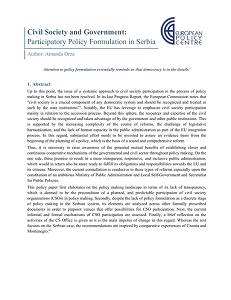CIVIL SOCIETY AND GOVERNMENT: Participatory Policy Formulation in Serbia
CIVIL SOCIETY AND GOVERNMENT: Participatory Policy Formulation in Serbia
Author(s): Amanda Orza
Subject(s): Civil Society, Governance
Published by: Centar za evropske politike CEP
Keywords: civil society; monitoring governance;European Commission;EU integration process;
Summary/Abstract: Up to this point, the issue of a systemic approach to civil society participation in the process of policy making in Serbia has not been resolved. In its last Progress Report, the European Commission notes that "civil society is a crucial component of any democratic system and should be recognized and treated as such by the state institutions". Notably, the EU has leverage to emphasize civil society participation mainly in relation to the accession process. Beyond this sphere, the resources and expertise of the civil society should be recognized and taken advantage of by the government and other public institutions. This is supported by the increasing complexity of the course of reforms, the challenge of legislative harmonization, and the lack of human capacity in the public administration as part of the EU integration process. In this regard, substantial effort needs to be invested to assure an evidence basis from the beginning of the planning of a policy, which is the basis of a sound and comprehensive reform. // This policy paper first elaborates on the policy making landscape in terms of its lack of transparency, which is deemed to be the precondition of a planned, and predictable participation of civil society organizations (CSOs) in policy making. Secondly, despite the lack of policy formulation as a discrete stage of policy making in the Serbian system, its elements are analyzed across other formally prescribed documents in order to pinpoint venues that offer possibilities for CSO participation. Next, the current informal and formal mechanisms of CSO participation are assessed. Finally, a brief reflection on the activities of the CS Office is given as it is the main impetus of change in this regard. Whereas the text focuses on the Serbian case, the recommendations are inspired by comparative experiences of Croatia and Montenegro.
Series: Centar za evropske politike - STUDIES
- Page Count: 12
- Publication Year: 2015
- Language: English
- Content File-PDF

